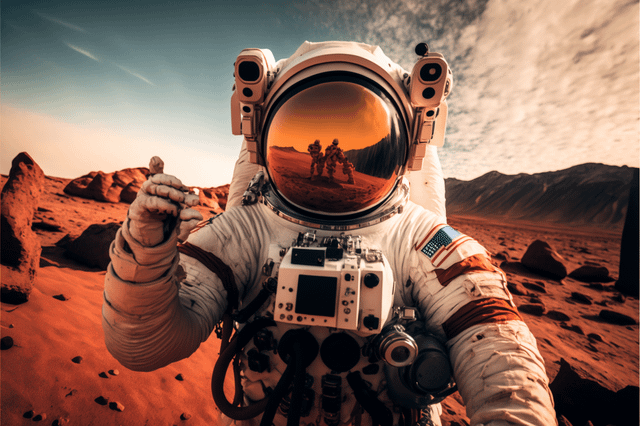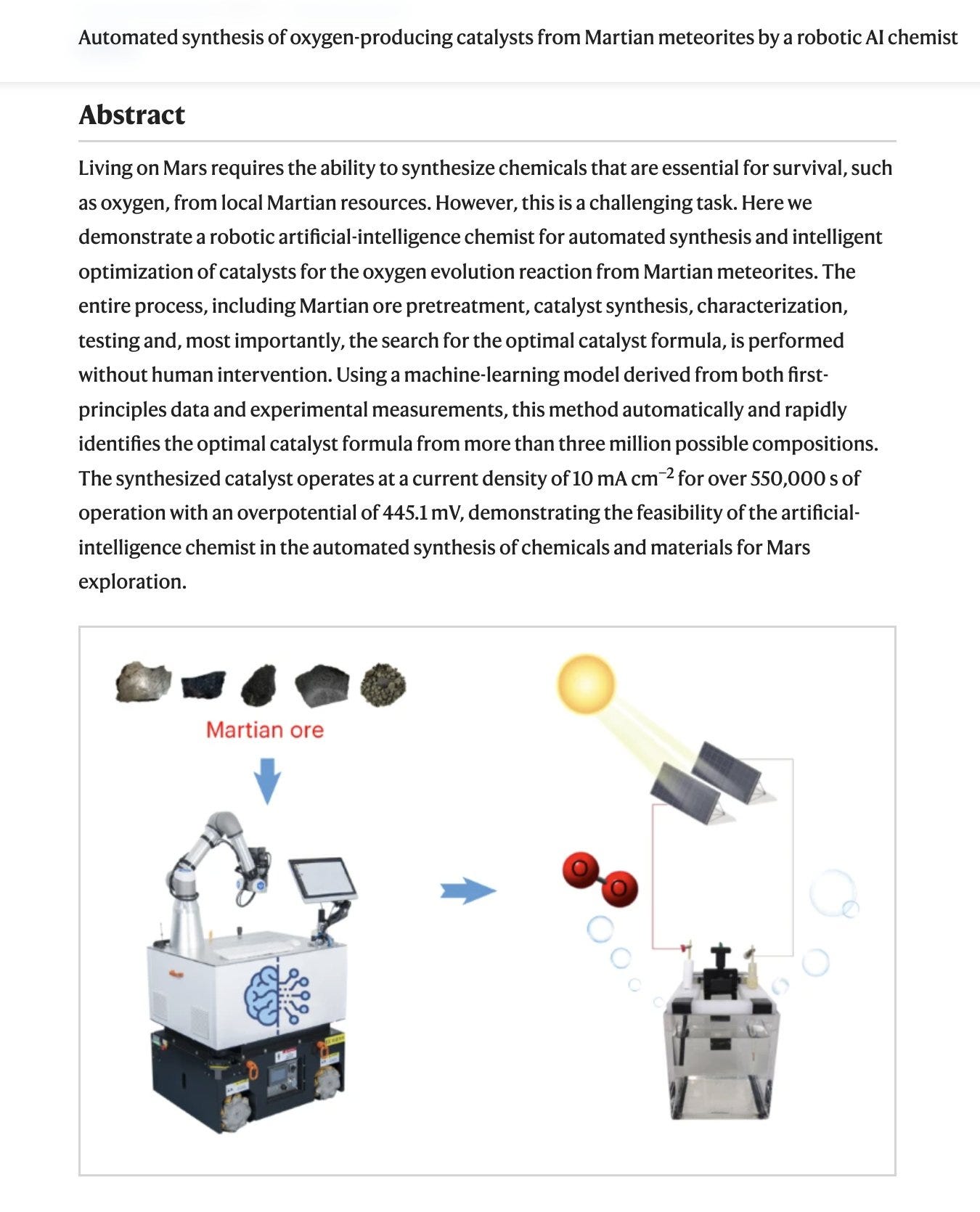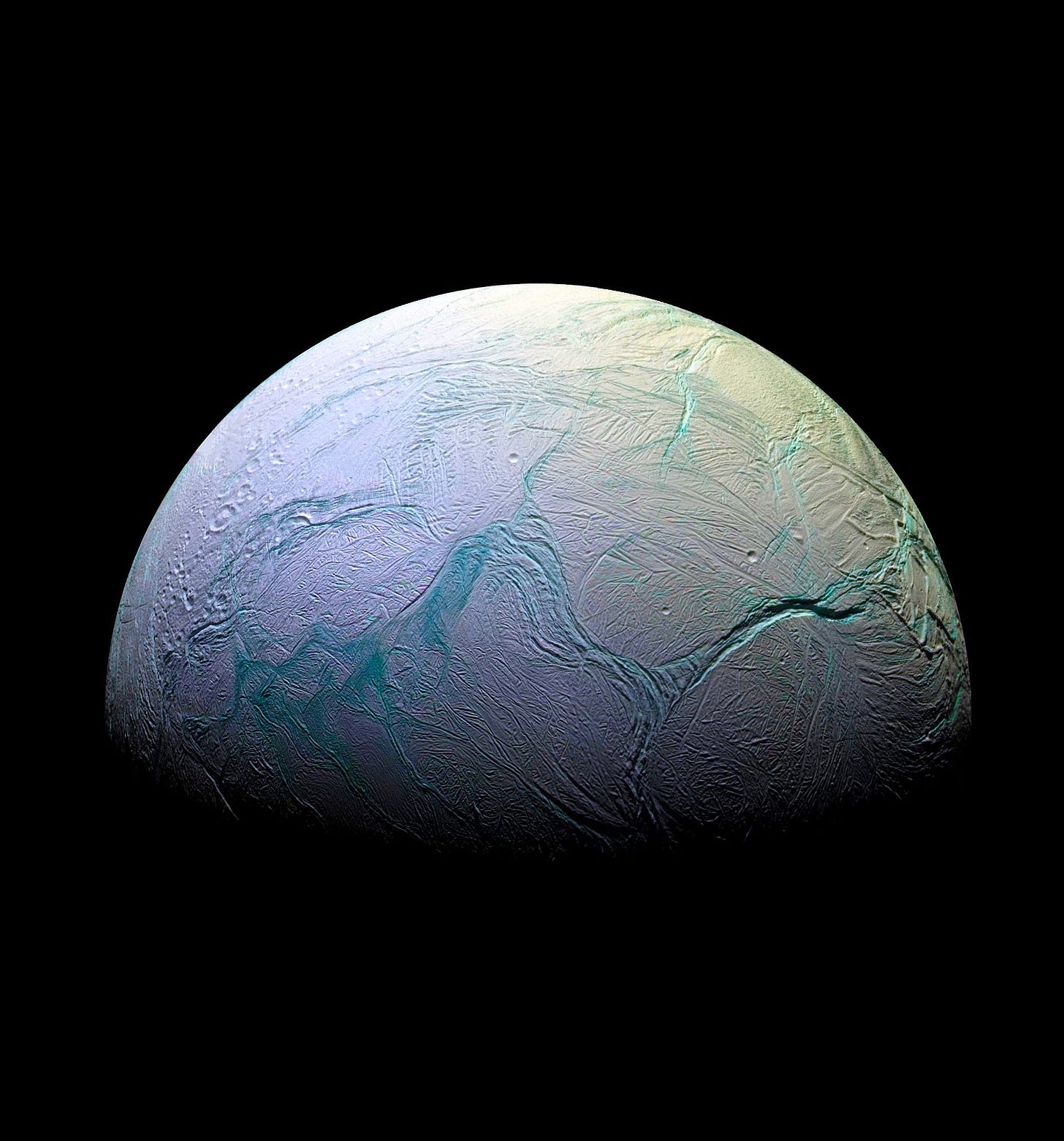How AI Might help us Survive on Mars
Robot Chemists, Mars, AI Laboratories and the future of civilization. 💀
Hey Everyone,
First, a message from my deepest sci-fi psyche:
🪐“Mars has for decades attracted intensive scientific exploration and research in countries worldwide. Finding signs of past life and building potentially habitable regions on Mars have long been a dream of humanity.”
This article is made free by today’s Sponsor.
MindOS - Build your AI team for 10x productivity
Better agent creation experience with built-in workflow and APIs.
Hire unlimited professional agents in marketplace to complete everyday tasks.
Sometimes a story in the week really sparks the imagination, and while rumours of China need to be taken with a grain of salt, there is an example of China and Mars that is pretty telling.
By the time human civilization on Earth gets to Mars, the red Planet, our robotics and artificial intelligence is going to be pretty advanced, relative to today. I’m excited enough just by the prospect of robots at Amazon, a story Conrad Gray is going to hopefully bringing to us later this month in a guest post.
If you enjoy my work, join 500+ others to get more deep dives on a range of topics related to A.I.
Given the current trajectory I believe China will beat us to a Lunar base and to Mars. This is because the Chinese are expansionist builders and understand the mining opportunities are going to be very lucrative in the 21st century in space and space-technology.
In June, 2021 it was reported by Reuters that indeed China aims to send its first crewed mission to Mars in 2033, with regular follow-up flights to follow, under a long-term plan to build a permanently inhabited base on the Red Planet and extract its resources.
China wants to start building a lunar base using soil from the moon in five years, so that’s by 2028. There’s no way NASA will be able to follow what China plans on doing, but will SpaceX?
I’m not myself a transhumanist when it comes to cybernetics or synthetic biology, but I' am strongly in favor of becoming a multi-planetary civilization. I think this should be among our highest priorities if we want human civilization not to go extinct. This is because we are too close to the bring on too many fronts for potential evolutionary dead-ends for humanity.
A Robotic ‘A.I. Chemist’ Could Make Oxygen on Mars
We know that Generative A.I. is going to enable AI robotic labs that will be able to help make scientific discoveries. Some early prototypes are starting to take shape in 2023.
AI in drug development is a microcosm of how this might work for other domains. This story out of China really blew up this week in terms of superficial headline news about AI this week.
A robotic AI Laboratory in China recently found the optimal formula that was tested in simulated low-temperature conditions of Mars, according to researchers.
Researchers in China have developed a robot chemist powered by artificial intelligence (AI) that might be able to extract oxygen from water on Mars. What?
The story is full of Chinese Nationalistic vibes and the progress of humanity.
The same process would have taken a human 2,000 years, according to researchers. Really?
The discovery demonstrates the feasibility of the AI chemist in the automated synthesis of chemicals and materials for Mars exploration, according to a study published in the journal Nature Synthesis on Monday November 13th, 2023.
The system calculated more than 3.7 million molecules it could make from six different metallic elements in the rocks.
It’s a thought-provoking story on the outside, but what is it really saying? It’s saying China is serious about space-technology and creating bases in the solar system and may seek to get to them first. We know that India is likely to be a future competitor.
It’s not clear if this will ever be a major priority for the United States Government. China has its own versions of SpaceX in development. China is more advanced in space-technology than is usually talked about in the Western mainstream media. Why might that be?
“If you think about the challenge of going to Mars, you have to work with local materials,” says Andy Cooper, a chemist at the University of Liverpool, UK. “So I can see the logic behind it.”
The “robot”, and I have no idea why China calls it a robot (it’s all about the AI), uses materials found on the red planet to produce catalysts that break down water, releasing oxygen. The idea could complement existing oxygen-generating technologies or lead to the development of other catalysts able to synthesize useful resources on Mars.
Now obviously, sending supplies, such as oxygen, to Mars is extremely expensive so being able to create it on the red planet could remove a major barrier to establishing future colonies. A good amount of National Defense contracts are actually about space-technologies even as a good amount of quantum technologies in development have implications to, you guessed it, space-technology and Solar system bases and habitats.
As for the colonization of Mars, we know that robots could build colonies, before we arrive and they will. We also know what AI systems will function as major nexus of organization, communication and management by the time we “colonize” Mars and other places in the solar system like where Enceladus, Titan and Ceres come to mind.
So this PR out of China is actually rather good news for the sci-fi nerds in the technological optimists among us. But certainly a Martian colony could be the most feasible society that could eventually one day become self-sustainable. If that’s even entirely possible?
"We have developed a robotic AI system that has a chemistry brain," said study lead Jun Jiang at the University of Science and Technology of China in Hefei, per Nature News.
How Chinese scientists and outlets frame thing is a little different.
⚗️This is the entire key to understanding this.
It certainly does spark the imagination and makes you question how China will compete with the U.S. in space. How will India emerge just as we are ready to colonize Mars in a few decades? How will robots and AI be implicated in our future societies and will they be less prone to extinction?
The study, published in Nature Synthesis, was led by Jun Jiang at the University of Science and Technology of China in Hefei. Jiang and his team used a mobile machine the size of a refrigerator with a robotic arm to analyse five meteorites that had either come from Mars or been collected on Earth but mimicked the Martian surface. The team’s goal was to investigate whether the machine could produce useful catalysts from the material.
Publications even spun out YouTube videos around the story en masse:
Nature
This is the most neutral video I could find:
The New Scientist
View time: 43 seconds:
It’s Inevitable that we will Colonize Mars
There are very real economic, technological and geopolitical reasons to get to Mars first, and the AI arms race is also related to a Space race. You can even simulate this stuff in video games.
I believe China will invest more in space-technology and space-construction that will give it a significant lead in these sorts of technologies. SpaceX have inspired a generation, but until they go public likely in 2027 or later, we won’t know the details of their business.
Billionaire SpaceX investor Ron Baron recently told CNBC that he expects the company's satellite business, Starlink, to spin off and go public “in 2027 or so.” I actually think Starlink (satellite internet company) will go public around 2025. It’s simply not growing as fast as Elon Musk anticipated as part of SpaceX.
My impression is that India and the U.S. will have separate colonies from that of China on Mars at first. With perhaps another one from the EU. How society develops there will be super interesting and perhaps by then, likely the 2040s, we’ll have the robotics, AI and other technologies to help us sustain colonies there and manufacture what will be needed.
All these publications claim that the research out of China “underscores the importance of AI” in finding and refining the right catalysts among samples of five different categories of meteorites, sourced both from Mars itself, and from samples found on Earth known to have parallels on Mars. This may or may not be true.
One Step for Humanity, One Robotic Arm at a Time!
In the paper, Jiang and the team suggest their “robotic AI-chemist” could lead to the automated production of catalysts using Martian meteorites, providing a method for future Mars explorers to make oxygen on the planet’s surface.
The second best option is likely this place:
OMG, we have another video! How this “robotic AI-chemist” moves is so delightful.
It’s the “AI in the robot” dummy! moment. For me at least, how about for you?
Smithsonian
Damn, I just got to choose a robot thumbnail about Mars! Mom!
Anyways the entire story is a bit out there for 2023. But it won’t feel out of place in 2033, I can assure you of that.
Who is LUO Yi anyhow? Let’s check his faculty ID. Hmm. Seems legit.
The compound, known as a catalyst, is made entirely from elements found in Martian meteorites—which means, if such a system could work reliably, space travelers would not need to bring oxygen or even the catalyst needed to produce it. Yes, yes, I think most of us figured that out by now.
The robot chemist's ultimate aim is to find clever ways to make new compounds from on-the-ground resources. Indeed!
Recent evidence of water activity on Mars has raised the prospect of large-scale oxygen production through solar power-driven electrochemical water oxidation processes using an oxygen evolution reaction catalyst. True that.
China, take me away! And take that Elon Musk guy with you.
Postscript
The competition for in-situ oxygen production on Mars continues in 2023. According to the Register, earlier this year, Michael Hecht at MIT's Haystack Observatory led an investigation dubbed Mars Oxygen In-Situ Resource Utilization Experiment (MOXIE) on board NASA's Perseverance rover.
What new devices might be created for human colonies in the not so distant future? Let’s chip those AI chemist robots from Beijing already to Mars! The AI chemist can, without human intervention, synthesize OER catalysts on Mars from local ores.
“On Earth, we don’t use these six elements because we have more choice,” says Luo. “These six elements are not the best for this kind of catalyst and it limits its performance, but it’s what you’ve got on Mars.”
So it goes without saying that an Oxygen supply must be the top priority for any human activity on Mars, because rocket propellants and life support systems consume substantial amounts of oxygen, which cannot be replenished from the Martian atmosphere. I look forward to oxygen Labs being set up at the earliest.
The robot chemist made and tested 243 of the possible catalysts, according to Space.com’s Charles Q. Choi.
With its chosen catalyst, the system could produce oxygen from the Martian materials at around minus 37 degrees Celsius, demonstrating the chemical reaction could be feasible on the cold Martian surface.
Don’t tell the robots what to do!
“We think our machine can make use of compounds in Martian ores without human guidance.”
Robots and AIs seeding and preparing colonies, might just be the status-quo if human civilization is going to get serious about colonizing other planets. For the purpose of this Newsletter, we will be discussing AI in terms the future of own solar system in future articles.
I am also keen to continue my coverage of AI in science and AI in astronomy specifically. With the James Webb Space Telescope now in operation, we are getting so much better data, images and details. We are always discovering new exoplanets, some of them relatively close to home.
I for one am really excited to see how AI is intersecting with our new golden age of astronomy, cosmology and the history of the universe. The next two decades are rather important for applied space-technologies where robotics and AI increasingly become even more involved. As well as quantum technologies.









China is making huge strides in space exploration!